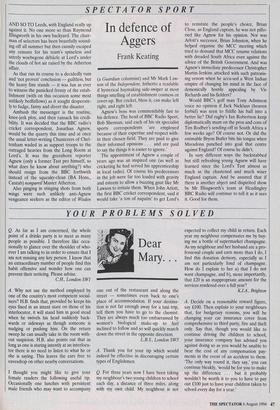SPECTATOR SPORT
In defence of Aggers
Frank Keating
AND SO TO Leeds, with England really up against it. No one more so than Raymond Illingworth in his own backyard. The chair- man of selectors has been boastfully sound- ing off all summer but then cannily escaped any censure for his team's spineless and utterly woebegone debacle at Lord's under the clouds of hot air raised by the Atherton affair.
As that ran its course to a decidedly rum and 'not proven' conclusion — guiltless, but the heavy fine stands — it was fun as ever to witness the panicked frenzy of the estab- lishment (with on this occasion some most unlikely bedfellows) as it sought desperate- ly to fudge, fanny and divert the disaster.
Ambush the messenger is the routine, knee-jerk ploy, and then ransack his credi- bility. It was decided that the BBC radio's cricket correspondent, Jonathan Agnew, would be the quarry this time and at once the usual letter-writing Chunterers of Chel- tenham waded in as support troops to the outraged heavies from the Long Room at Lord's. It was the greenhorn reporter Agnew (only a former Test pro himself, so what does he know about anything?) who should resign from the BBC forthwith instead of the squeaky-clean (BA Hons., Cantab) nonpareil Master Atherton.
Also pinging in stinging shots from both wings were such unlikely anti-Agnew vengeance seekers as the editor of Wisden (a Guardian columnist) and Mr Mark Law- son of the Independent, hitherto a readable if hysterical haymaking side-swiper at most things smelling of establishment cosiness or cover-up. But cricket, bless it, can make left right, and right left.
Agnew's boss was commendably fast to his defence. The head of BBC Radio Sport, Bob Shennan, said each of his six specialist sports correspondents 'are employed because of their expertise and respect with- in their chosen field. They are paid to give their informed opinions . . . and are paid to say the things it is easier to ignore.' The appointment of Agnew a couple of years ago was an inspired one (as well as cricketing he had served his apprenticeship in local radio). Of course his predecessors in the job were far too loaded with gravity and esteem to allow a buzzing gnat like Mr Lawson to irritate them. When John Arlott, the first BBC cricket correspondent, said it would take `a ton of napalm' to get Lord's
to reinstate the people's choice, Brian. Close, as England captain, he was not pillo- ried like Agnew for his opinion. Nor was Arlott's successor, Brian Johnston, when he helped organise the MCC meeting which tried to demand that MCC resume relations with dreaded South Africa even against the advice of the British Government. And was Agnew's immediate predecessor Christopher Martin-Jenkins attacked with such patronis- ing venom when he accu-sed a West Indian umpire of changing his mind in the face of demonically hostile appealing by Viv Richards and his fielders?
Would BBC's golf man Tony Adamson voice no opinion if Jack Nicklaus (heaven forbid) was seen to fiddle his ball into a better lie? Did rugby's Ian Robertson keep diplomatically mum on the pros and cons of Tim Rodber's sending-off in South Africa a few weeks ago? Of course not. Or did the estimable Bryon Butler bite his tongue when Maradona punched into goal that centre against England? Of course he didn't.
In very different ways the backstabhed but still refreshing young Agnew will have learned since the Lord's Test almost as much as the chastened and much wiser England captain. And be assured that if there is another abject and dispirited show by Mr Illingworth's team at Headingley BBC Radio will continue to tell it as it sees it. Good for them.


















































 Previous page
Previous page